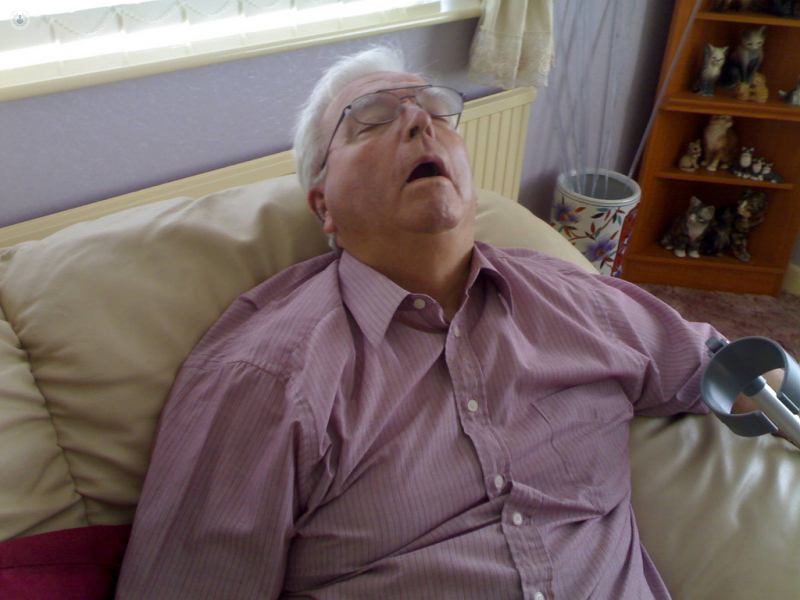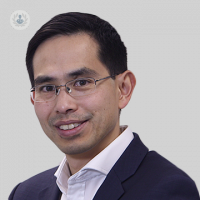Obstructive sleep apnoea and the heart
Written by:Sleep. Whether you’re up at the crack of dawn or enjoy a lie-in; whether you’re an early bird or a night owl; whether you need six hours or ten, we all need our forty winks to feel refreshed. However, what if it doesn’t work? Do you ever feel more tired after sleeping? If this happens a lot, it may be more than simply a bad night’s sleep. What’s more, obstructive sleep apnoea can have knock-on effects on your mental state and even your heart. Top cardiologist Dr Boon Lim explains:

What is obstructive sleep apnoea?
Obstructive sleep apnoea (OSA) is a very common sleeping condition, which leads to repetitive episodes of apnoea (pronounced ap-nee-ah), which means cessation of breathing for a number of seconds, leading to transient unrecognised waking. This basically means the patient is waking up without knowing they’re waking. This can happen to the extent that sleep is disturbed and the patient suffers with excessive daytime sleepiness and fatigue. The biggest risk factor for apnoea is obesity, and with the rise of obesity in western society, sleep apnoea is becoming increasingly prevalent.
Why do patients get obstructive sleep apnoea?
Obstructive sleep apnoea is to do with the trachea (windpipe) being compressed many times during the night due to relaxation of the muscles around the trachea. In order for the muscles to fight the weight of the back of the tongue as well as the neck, you need to be in a moment of alertness that is incompatible with restful sleep. The majority of patients have the obstructive variety of sleep apnoea.
What are the symptoms and risks associated with obstructive sleep apnoea?
There are several symptoms that can be caused by OSA:
- Snoring
- Startling yourself awake at night
- Excessive daytime tiredness/fatigue
- Not feeling rested after many hours of sleep
- Stress
- Depression
In terms of measuring daytime sleepiness, doctors may have patients fill out a questionnaire based on the Epworth Sleepiness Scale (ESS) to help diagnose sleep apnoea. In this questionnaire, patients answer questions relating to how likely they are to doze off during the daytime whilst performing normal activities such as sitting and reading, sitting in a car as a passenger, and whilst watching TV. A high score indicates an increased likelihood of having sleep apnoea.
With sleep apnoea is also a risk of developing other cardiovascular conditions, such as diabetes and hypertension, and a strong emerging complication of having obstructive sleep apnoea is that patients start to develop atrial fibrillation.
Why is OSA associated with the development of atrial fibrillation?
During sleep, you need to be in a very restful and relaxed state, which is a “vagal” state, also known as the rest and digest response. However, during sleep apnoea, this is interrupted many times by its polar opposite – the fight or flight response: the sympathetic nervous system responds to not being able to breathe properly, stimulating the release of adrenaline. This creates the sleep paradox during sleep apnoea – you can’t get rest while sleeping, even when sleeping for a longer time, due to the repetitive waking/sleep cycles.
It’s not normal for the body to be subjected to such contrasting swings between the resting and active autonomic states. This can put the heart under considerable strain and is a trigger for heart rhythm abnormalities, the most common of which is atrial fibrillation.
If I have atrial fibrillation how can I get screened for OSA?
You can visit your GP and ask to be referred for a formal sleep assessment or you can visit an atrial fibrillation specialist, who is familiar with and able to diagnose OSA with a simple-to-use sleep monitoring devices such as WatchPAT wrist and finger-based portable sleep diagnostic device.
How does obstructive sleep apnoea impact on my atrial fibrillation treatment?
Your cardiologist should be advising on aggressive management of the sleep apnoea, which includes losing weight and treating hypertension and diabetes. For sleep apnoea, this usually involves initiation of CPAP (continuous positive airways pressure) therapy, which is a facemask that increases the air pressure in your trachea to keep it from collapsing during sleep, allowing you to have a more restful night’s sleep. Once the OSA and other factors have been successfully treated, your cardiologist will usually reassess the suitability of specific treatment for atrial fibrillation, including ablation.
Recent trial data has suggested that treating sleep apnoea and other risk factors associated with this, including hypertension and diabetes, is just as effective as ablation in improving symptoms of AF. Therefore, there is a lot to gain from making a formal diagnosis of OSA, and getting the appropriate management steps in place to help treat patients holistically.
To see a cardiologist who is an expert in assessing cardiovascular risk, including OSA and AF, get in touch with Dr Lim.


